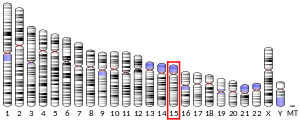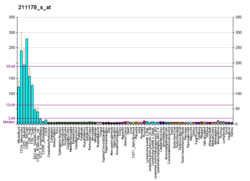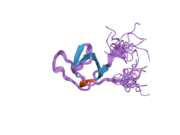From Wikipedia, the free encyclopedia
Enzyme found in humans
Proline-serine-threonine phosphatase-interacting protein 1 is an enzyme that in humans is encoded by the PSTPIP1 gene .[ 5] [ 6]
Interactions
PSTPIP1 has been shown to interact with:
See also
References
^ a b c GRCh38: Ensembl release 89: ENSG00000140368 – Ensembl , May 2017^ a b c GRCm38: Ensembl release 89: ENSMUSG00000032322 – Ensembl , May 2017^ "Human PubMed Reference:" . National Center for Biotechnology Information, U.S. National Library of Medicine .^ "Mouse PubMed Reference:" . National Center for Biotechnology Information, U.S. National Library of Medicine .^ a b Li J, Nishizawa K, An W, Hussey RE, Lialios FE, Salgia R, Sunder-Plassmann R, Reinherz EL (February 1999). "A cdc15-like adaptor protein (CD2BP1) interacts with the CD2 cytoplasmic domain and regulates CD2-triggered adhesion" . EMBO J . 17 (24): 7320–36. doi :10.1093/emboj/17.24.7320 . PMC 1171078 PMID 9857189 . ^ "Entrez Gene: PSTPIP1 proline-serine-threonine phosphatase interacting protein 1" .^ Cong F, Spencer S, Côté JF, Wu Y, Tremblay ML, Lasky LA, Goff SP (December 2000). "Cytoskeletal protein PSTPIP1 directs the PEST-type protein tyrosine phosphatase to the c-Abl kinase to mediate Abl dephosphorylation" . Mol. Cell . 6 (6): 1413–23. doi :10.1016/s1097-2765(00)00138-6 PMID 11163214 . ^ Ewing RM, Chu P, Elisma F, Li H, Taylor P, Climie S, McBroom-Cerajewski L, Robinson MD, O'Connor L, Li M, Taylor R, Dharsee M, Ho Y, Heilbut A, Moore L, Zhang S, Ornatsky O, Bukhman YV, Ethier M, Sheng Y, Vasilescu J, Abu-Farha M, Lambert JP, Duewel HS, Stewart II, Kuehl B, Hogue K, Colwill K, Gladwish K, Muskat B, Kinach R, Adams SL, Moran MF, Morin GB, Topaloglou T, Figeys D (2007). "Large-scale mapping of human protein-protein interactions by mass spectrometry" . Mol. Syst. Biol . 3 : 89. doi :10.1038/msb4100134 . PMC 1847948 PMID 17353931 . ^ Dowbenko D, Spencer S, Quan C, Lasky LA (January 1998). "Identification of a novel polyproline recognition site in the cytoskeletal associated protein, proline serine threonine phosphatase interacting protein" . J. Biol. Chem . 273 (2): 989–96. doi :10.1074/jbc.273.2.989 PMID 9422760 . ^ Spencer S, Dowbenko D, Cheng J, Li W, Brush J, Utzig S, Simanis V, Lasky LA (August 1997). "PSTPIP: a tyrosine phosphorylated cleavage furrow-associated protein that is a substrate for a PEST tyrosine phosphatase" . J. Cell Biol . 138 (4): 845–60. doi :10.1083/jcb.138.4.845 . PMC 2138048 PMID 9265651 . ^ Wu Y, Spencer SD, Lasky LA (March 1998). "Tyrosine phosphorylation regulates the SH3-mediated binding of the Wiskott–Aldrich syndrome protein to PSTPIP, a cytoskeletal-associated protein" . J. Biol. Chem . 273 (10): 5765–70. doi :10.1074/jbc.273.10.5765 PMID 9488710 .
Further reading
Spencer S, Dowbenko D, Cheng J, Li W, Brush J, Utzig S, Simanis V, Lasky LA (1997). "PSTPIP: a tyrosine phosphorylated cleavage furrow-associated protein that is a substrate for a PEST tyrosine phosphatase" . J. Cell Biol . 138 (4): 845–60. doi :10.1083/jcb.138.4.845 . PMC 2138048 PMID 9265651 . Dowbenko D, Spencer S, Quan C, Lasky LA (1998). "Identification of a novel polyproline recognition site in the cytoskeletal associated protein, proline serine threonine phosphatase interacting protein" . J. Biol. Chem . 273 (2): 989–96. doi :10.1074/jbc.273.2.989 PMID 9422760 . Wu Y, Spencer SD, Lasky LA (1998). "Tyrosine phosphorylation regulates the SH3-mediated binding of the Wiskott–Aldrich syndrome protein to PSTPIP, a cytoskeletal-associated protein" . J. Biol. Chem . 273 (10): 5765–70. doi :10.1074/jbc.273.10.5765 PMID 9488710 . Wu Y, Dowbenko D, Lasky LA (1998). "PSTPIP 2, a second tyrosine phosphorylated, cytoskeletal-associated protein that binds a PEST-type protein-tyrosine phosphatase" . J. Biol. Chem . 273 (46): 30487–96. doi :10.1074/jbc.273.46.30487 PMID 9804817 . Cong F, Spencer S, Côté JF, Wu Y, Tremblay ML, Lasky LA, Goff SP (2000). "Cytoskeletal protein PSTPIP1 directs the PEST-type protein tyrosine phosphatase to the c-Abl kinase to mediate Abl dephosphorylation" . Mol. Cell . 6 (6): 1413–23. doi :10.1016/S1097-2765(00)00138-6 PMID 11163214 . Oda A, Ochs HD, Lasky LA, Spencer S, Ozaki K, Fujihara M, Handa M, Ikebuchi K, Ikeda H (2001). "CrkL is an adapter for Wiskott–Aldrich syndrome protein and Syk" . Blood . 97 (9): 2633–9. doi :10.1182/blood.V97.9.2633 PMID 11313252 . Côté JF, Chung PL, Théberge JF, Hallé M, Spencer S, Lasky LA, Tremblay ML (2002). "PSTPIP is a substrate of PTP-PEST and serves as a scaffold guiding PTP-PEST toward a specific dephosphorylation of WASP" . J. Biol. Chem . 277 (4): 2973–86. doi :10.1074/jbc.M106428200 PMID 11711533 . Wise CA, Gillum JD, Seidman CE, Lindor NM, Veile R, Bashiardes S, Lovett M (2002). "Mutations in CD2BP1 disrupt binding to PTP PEST and are responsible for PAPA syndrome, an autoinflammatory disorder" . Hum. Mol. Genet . 11 (8): 961–9. doi :10.1093/hmg/11.8.961 PMID 11971877 . Badour K, Zhang J, Shi F, McGavin MK, Rampersad V, Hardy LA, Field D, Siminovitch KA (2003). "The Wiskott–Aldrich syndrome protein acts downstream of CD2 and the CD2AP and PSTPIP1 adaptors to promote formation of the immunological synapse" . Immunity . 18 (1): 141–54. doi :10.1016/S1074-7613(02)00516-2 PMID 12530983 . Shoham NG, Centola M, Mansfield E, Hull KM, Wood G, Wise CA, Kastner DL (2003). "Pyrin binds the PSTPIP1/CD2BP1 protein, defining familial Mediterranean fever and PAPA syndrome as disorders in the same pathway" . Proc. Natl. Acad. Sci. U.S.A . 100 (23): 13501–6. Bibcode :2003PNAS..10013501S . doi :10.1073/pnas.2135380100 PMC 263843 PMID 14595024 . Rual JF, Venkatesan K, Hao T, Hirozane-Kishikawa T, Dricot A, Li N, Berriz GF, Gibbons FD, Dreze M, Ayivi-Guedehoussou N, Klitgord N, Simon C, Boxem M, Milstein S, Rosenberg J, Goldberg DS, Zhang LV, Wong SL, Franklin G, Li S, Albala JS, Lim J, Fraughton C, Llamosas E, Cevik S, Bex C, Lamesch P, Sikorski RS, Vandenhaute J, Zoghbi HY, Smolyar A, Bosak S, Sequerra R, Doucette-Stamm L, Cusick ME, Hill DE, Roth FP, Vidal M (2005). "Towards a proteome-scale map of the human protein-protein interaction network". Nature . 437 (7062): 1173–8. Bibcode :2005Natur.437.1173R . doi :10.1038/nature04209 . PMID 16189514 . S2CID 4427026 . Baum W, Kirkin V, Fernández SB, Pick R, Lettau M, Janssen O, Zörnig M (2005). "Binding of the intracellular Fas ligand (FasL) domain to the adaptor protein PSTPIP results in a cytoplasmic localization of FasL" . J. Biol. Chem . 280 (48): 40012–24. doi :10.1074/jbc.M502222200 PMID 16204241 . Yang H, Reinherz EL (2006). "CD2BP1 modulates CD2-dependent T cell activation via linkage to protein tyrosine phosphatase (PTP)-PEST" . J. Immunol . 176 (10): 5898–907. doi :10.4049/jimmunol.176.10.5898 PMID 16670297 . Ewing RM, Chu P, Elisma F, Li H, Taylor P, Climie S, McBroom-Cerajewski L, Robinson MD, O'Connor L, Li M, Taylor R, Dharsee M, Ho Y, Heilbut A, Moore L, Zhang S, Ornatsky O, Bukhman YV, Ethier M, Sheng Y, Vasilescu J, Abu-Farha M, Lambert JP, Duewel HS, Stewart II, Kuehl B, Hogue K, Colwill K, Gladwish K, Muskat B, Kinach R, Adams SL, Moran MF, Morin GB, Topaloglou T, Figeys D (2007). "Large-scale mapping of human protein-protein interactions by mass spectrometry" . Mol. Syst. Biol . 3 (1): 89. doi :10.1038/msb4100134 . PMC 1847948 PMID 17353931 .







